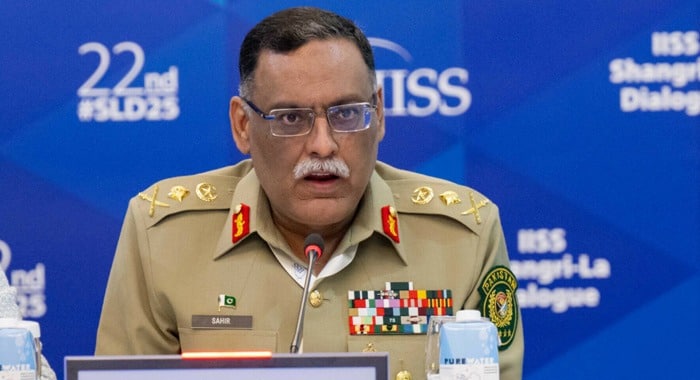Pakistan’s Chairman Joint Chiefs of Staff Committee, General Sahir Shamshad Mirza, warned on Saturday that unresolved conflicts in South Asia remain volatile and could spiral out of control without credible mechanisms for crisis management and de-escalation.
Speaking at the prestigious Shangri-La Dialogue in Singapore, General Mirza said that the Asia-Pacific region has become the geopolitical cockpit of the 21st century, yet the architecture for managing crises remains fragile and uneven at the institutional level.
“No mechanism can function in an environment of distrust,” the general stated. “Sustainable crisis management requires strategic understanding, mutual respect for red lines, and equity.”
He cautioned that as long as key stakeholders in regional security are perceived as weak or excluded, no regional framework can succeed, especially if cooperative structures are misused for deterrence rather than genuine engagement.
Call for Institutional Mechanisms
General Mirza criticised the current reliance on ad hoc responses, calling instead for institutional protocols, operational hotlines, and pre-agreed de-escalation procedures, including joint crisis management exercises. He emphasized the growing influence of emerging technologies such as artificial intelligence, cyber intrusions, and real-time battlefield surveillance, which he said now directly shape strategic decisions.
“These technologies are no longer futuristic—they are shaping today’s conflicts. Our crisis management frameworks must reflect that.”
Kashmir and South Asia in Focus
General Mirza argued that South Asia cannot be excluded from Asia-Pacific security dialogues, noting that unresolved issues like Kashmir continue to pose a serious threat to regional peace.
“There are several flash-points in South Asia that remain unresolved and could escalate without warning. Confidence-building measures must aim to eliminate ambiguity and miscalculation,” he said.
He also criticised the erosion of international norms, stating that power and self-interest have overtaken ethics and principles in global affairs.
“Those who claim to uphold a free world have themselves undermined sovereignty, territorial integrity, human rights, and the rules-based international order.”
Strategic Communication and Trust
The general emphasized that strategic communication is essential to conflict prevention, adding that misunderstandings and misinformation often fuel escalation. He called for diplomatic channels that offer clarity, not confusion, and warned against the assumption that suppressing regional or ideological disputes leads to resolution.
“Peaceful dispute resolution and credible pathways for dialogue must be central to any sustainable security mechanism.”





